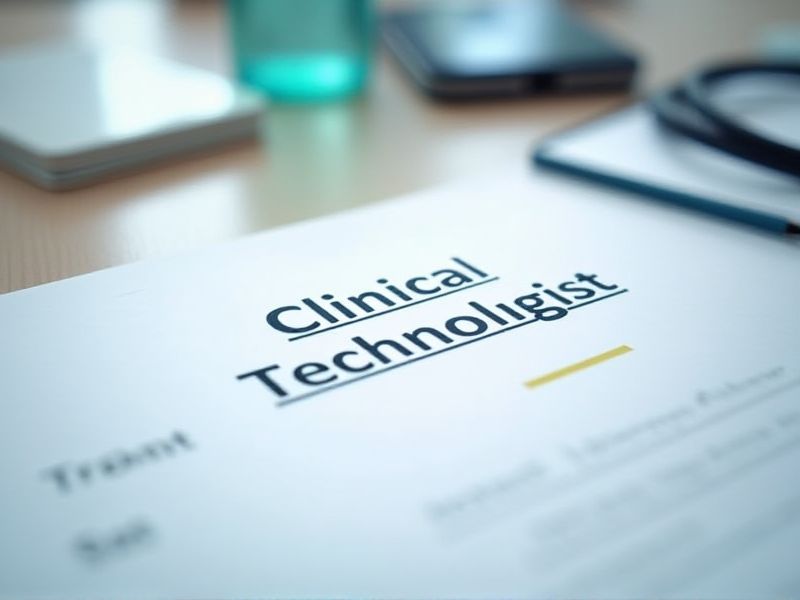
Clinical Laboratory Technologists play a crucial role in the healthcare system by conducting complex tests that aid in the diagnosis and treatment of diseases. Certifications ensure these professionals possess the specialized knowledge and skills required to perform accurate laboratory analyses and maintain high standards of patient safety. Regulatory bodies and employers often require certifications to demonstrate a technologist's competence and adherence to industry standards. Here are key certifications Clinical Laboratory Technologists may need.
ASCP Board of Certification - MLS (Medical Laboratory Scientist)
The ASCP Board of Certification for Medical Laboratory Scientists establishes an essential standard, ensuring clinical laboratory technologists have validated competence and skills. Passing the MLS certification demonstrates proficiency in clinical laboratory techniques, critical for maintaining diagnostic accuracy and patient safety. Hospitals and healthcare facilities often require this certification to ensure they meet regulatory and accreditation requirements for quality care. Professional recognition as an MLS enhances career advancement opportunities and job security within the medical laboratory field.
American Medical Technologists (AMT) Certification - MLS
Obtaining the AMT Certification for Medical Laboratory Scientists (MLS) enhances a technologist's credibility and demonstrates their commitment to maintaining industry standards. The certification bridges the skills gap identified in many lab settings, ensuring the individual possesses the necessary expertise for accurate diagnostics. Hospitals and clinics often require this certification as it aligns with regulatory compliance, contributing to patient safety and quality care. Certified technologists typically experience better job opportunities and career advancement due to recognized competence and professionalism.
American Association of Bioanalysts (AAB) Certification
The AAB Certification establishes a recognized standard for clinical laboratory technologists, ensuring proficiency and competence in laboratory practices. This certification enhances professional credibility and can increase job opportunities and career advancement in the competitive healthcare field. Employers often prefer or require AAB-certified technologists because it signifies adherence to quality and accuracy in laboratory testing. The certification aligns professionals with ongoing education requirements, contributing to staying current with advancements in laboratory technology and methodologies.
National Credentialing Agency for Laboratory Personnel (NCA) Certification
NCA Certification ensures that Clinical Laboratory Technologists meet standardized knowledge and skill levels, crucial for maintaining high-quality laboratory services. This certification validates a technologist's competence, which builds trust with healthcare providers and patients. Achieving NCA Certification can lead to improved job prospects and the possibility of higher salaries, reflecting the value of certified professionals. It fosters a commitment to ongoing education, ensuring technologists stay updated with advancements in the field.
ASCP Specialist in Microbiology (SM) Certification
The ASCP Specialist in Microbiology (SM) Certification validates advanced knowledge and skills, enhancing professional credibility for Clinical Laboratory Technologists. Holding this certification can lead to better job prospects, as employers often prefer candidates with recognized credentials. The certification ensures technologists are equipped to handle complex microbiological challenges, potentially improving patient outcomes. It also signifies a commitment to ongoing education and adherence to industry standards, promoting trust within the healthcare community.
ASCP Specialist in Blood Banking (SBB) Certification
Obtaining an ASCP Specialist in Blood Banking (SBB) Certification enhances a Clinical Laboratory Technologist's expertise in complex blood banking techniques. It leads to increased job opportunities and career advancement within specialized medical fields. Employers often prefer or require this certification as it signifies a high level of competence and dedication. The certification helps mitigate risks by ensuring adherence to industry standards and best practices in blood bank management.
Certified Phlebotomy Technician (CPT)
Employing a Certified Phlebotomy Technician (CPT) in a clinical laboratory ensures accurate blood collection, which directly impacts the reliability of test results. Proper phlebotomy techniques help in minimizing patient discomfort and reducing the risk of complications like infections or bruising. Certification establishes a standard of competence, enhancing patient safety and trust in the laboratory's operations. Laboratories benefit from improved workflow and efficiency by integrating skilled CPTs into their teams.
Clinical Laboratory Improvement Amendments (CLIA) Waiver Certification
The Clinical Laboratory Improvement Amendments (CLIA) Waiver Certification is required to ensure that all diagnostic tests meet rigorous quality standards, protecting patient safety. By obtaining this certification, Clinical Laboratory Technologists can perform certain diagnostic tests with reduced complexity outside traditional labs, expanding access to essential medical testing. The waiver assures that tests performed under this certification maintain accuracy and reliability, which is crucial for correct diagnosis and treatment decisions. The certification is instrumental in facilitating quicker testing processes, particularly in point-of-care settings, improving healthcare delivery and efficiency.
Certified Public Health Laboratory Practitioner (CPHLP)
Clinical Laboratory Technologists require Certified Public Health Laboratory Practitioners to ensure adherence to public health standards and regulations. The expertise of CPHLPs enhances the accuracy and reliability of laboratory results, critical for patient diagnoses and treatment plans. Their specialized training in managing public health threats equips laboratories to effectively respond to emerging infectious diseases. The presence of a CPHLP promotes a unified approach to quality control, benefiting overall laboratory operations and public health safety.
Certificate in Laboratory Management and Leadership
Clinical Laboratory Technologists benefit from a Certificate in Laboratory Management and Leadership as it enhances their skills in overseeing laboratory operations efficiently. Improved leadership abilities enable technologists to manage teams effectively and ensure compliance with regulations. Understanding management concepts reduces errors and increases the overall accuracy of test results. As healthcare demands grow, having specialized management skills positions technologists for career advancement and better job prospects.
Summary
By obtaining certifications, you'll enhance your expertise and credibility as a Clinical Laboratory Technologist. This leads to increased job prospects and potential for higher salaries as employers value certified professionals. Certifications often update you with the latest industry standards, ensuring your work aligns with current best practices. You might also find opportunities for career advancement as your specialized skills become more recognized.
